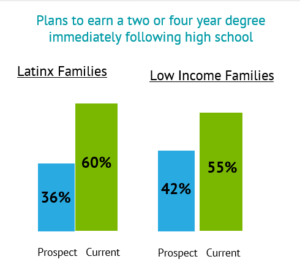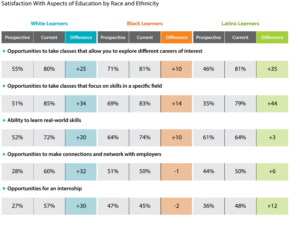![]() Today, Advance CTE released a new report and updated resources on messages that resonate with families about the value and benefits of Career Technical Education (CTE), and how they should be communicated to each learner to achieve effective and equitable recruitment into secondary CTE programs.
Today, Advance CTE released a new report and updated resources on messages that resonate with families about the value and benefits of Career Technical Education (CTE), and how they should be communicated to each learner to achieve effective and equitable recruitment into secondary CTE programs.
Communicating Career Technical Education: Learner-centered Messages for Effective Program Recruitment is an update to messaging research conducted in 2017 on families both participating in (current) and not participating in CTE (prospective). This new research includes an intentional focus on revealing differences in education preferences, experiences, and message and messenger impact among Black and Latinx families and families experiencing low income to advance a shared vision of CTE programs where each learner feels welcome in, is supported by, and has the means to succeed.
Encouragingly, the topline findings showed that an overarching message about ‘Preparing for the Real World’ resonated with learners and parents/guardians across participation, race, ethnicity and income:
Through CTE, learners gain real-world skills that prepare them to succeed in college and a career that they are passionate about.
However, the research also revealed important equity considerations that states should consider when supporting local systems in evaluating and taking steps to improve equity in program quality in hands-on particularly in regards to program quality, the impact of social capital and messenger trust.
1. Learners in CTE have more opportunities to prepare for postsecondary education and are more confident about completing a degree.
The findings indicated that participation in CTE increased the likelihood that learners planned to complete a degree over completing ‘some college,’ particularly among Latinx families and families with low income.
 Additionally, 80 percent of families participating in CTE are satisfied with opportunities to jumpstart their postsecondary education in high school through opportunities to earn college credit and take advanced classes compared to just 60 percent of families not participating in CTE.
Additionally, 80 percent of families participating in CTE are satisfied with opportunities to jumpstart their postsecondary education in high school through opportunities to earn college credit and take advanced classes compared to just 60 percent of families not participating in CTE.
State Impact: These findings reinforce the importance of states designing seamless transfers from secondary to postsecondary education across all career pathways, removing barriers to accessing early postsecondary opportunities (EPSOs), and communicating these opportunities in digestible, intentional ways to families.
2. Informed school-based messengers are key for CTE enrollment, but online sources and messenger trust are key considerations for historically marginalized families.
While school counselors and teachers were the top two sources for both families in and outside CTE to receive information about CTE programs, families from historically marginalized populations also consistently included online sources such as Google search and school websites in their top two sources. 
Significantly, historically marginalized learners not participating in CTE were less likely to choose school counselors as a top source than parents/guardians. While 84 percent of prospective Latinx parents/guardians would likely consult a school counselor about CTE, only 37 percent of prospective Latinx learners would. Among Black families, 74 percent of prospective Black parents/guardians would likely consult a school counselor about CTE while only 59 percent of prospective Black learners would.
State Impact: These findings reinforce the importance of states designing communication campaigns through multiple avenues with reinforced messaging like those found in our updated messaging triangle (LINK), as well as examining systemic barriers and solutions to building more diverse school counselor and instructor talent pipelines.
3. Families participating in CTE are more satisfied across all aspects of their education, but intentional focus is needed on achieving equitable access to hands-on experiences.
The great news is across race, ethnicity and income, 88 percent of parents/guardians and learners participating in CTE are satisfied with their education experience compared to 75 percent of those considering CTE. This includes aspects such as quality of classes and teachers, opportunities for career exploration and skillbuilding, and even opportunities for advanced classes.
However, equitable satisfaction by race and income was not achieved for work-based learning experiences such as opportunities to connect and network with employers and opportunities for internships. For both of the aforementioned categories, satisfaction among current Black learners dropped 1 and 2 percentage points respectively compared to prospective Black leaners.
State Impact: As states continue to reimagine CTE programs and work-based learning experiences in this learning recovery, this finding reinforces the importance of designing programs on the margins and removing barriers to access to ensure each learner participates in high-quality programs across all career pathways, and to realize the full impact of these effective messages.
Overall, CTE provides the education experiences and benefits that families are looking for, but program quality is critical to achieve full message impact and effective recruitment. To read the full report and to access resources to put this research into action including a message triangle with tailoring for historically marginalized populations, please visit our Engaging Families and Learners web page. For resources on advancing equity and access in CTE programs, visit the Equity and Access page in Advance CTE’s Resource Center.
Stacy Whitehouse, Senior Associate Communications and State Engagement


